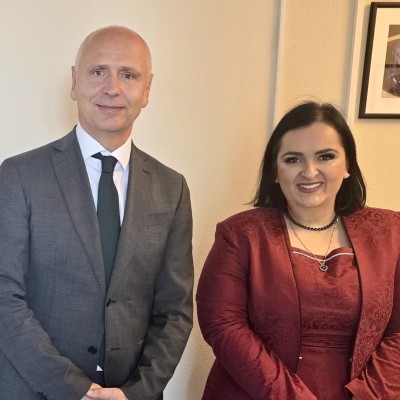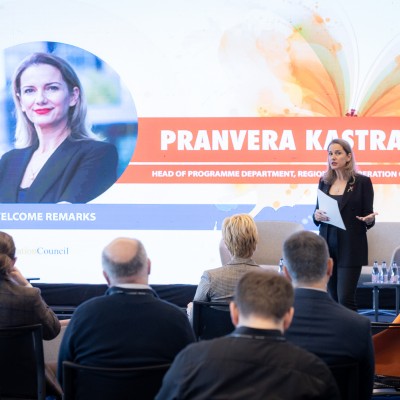RCC ESAP: Supporting exchange of experience on development and implementation of sector budget support
29 October 2018

RCC’s ESAP project supported a visit of the Albanian delegation from Ministry of Economy and Finance to Skopje to meet with Ministries of Labour and Social Policy, Education, Finance and Secretariat for European Affairs on 29 October 2018. (Photo: RCC ESAP/Sanda Topic)
Skopje – Employment and Social Affairs Platform (ESAP) project of the Regional Cooperation Council (RCC) supported the visit of the Albanian delegation from the Ministry of Economy and Finance to Skopje today.
The Albanian delegation visited their peers to share their experiences in the development and implementation of sector budget support as The Former Yugoslav Republic of Macedonia has not had a chance to deal with the issue as yet.
Namely, the Ministry of Labour and Social Policy and the Ministry of Education and Science in The Former Yugoslav Republic of Macedonia are considering implementing the Instrument for Pre-Accession Assistance (IPA) 2 allocations for 2019 through Sector Budget Support (SBS). SBS is an implementation modality strictly linked to the national priorities in a given area and Albania has already been implementing Sector Reform Contracts (SRC) in the Education and Employment sector.
Therefore, ESAP enabled this learning exchange between the representatives of the Ministry of Labour and Social Policy, Ministry of Education, Secretariat for European Affairs and Ministry of Finance in Skopje and the representatives of the Ministry of Economy and Finance of Albania as an opportunity to transfer relevant experiences and knowledge of the experts from Albania on the particular issues of preparation and practical implementation of the sector budget support in the fields related to employment, labour market, education, skills, social protection, and inclusion.
The two delegations discussed: Design of the programme, setting the indicators, definition of the tranches and conditions, deciding on the complementary projects; Role of the national authorities in the design and implementation of the SRC; specific institutional arrangements (if any) related to the SRC implementation; cooperation with the EU Delegation and international organisations; Challenges in the (early stage of) implementation: how to ensure the achievement of the annual targets; Preparation of the Annual reports and monitoring of the programme; Any lessons learned so far about the advantages of the SBS versus the project-based approach; and finally, the best communication approaches for the SBS design and implementation.
Specifically, the hosts heard that in Albania the Sector Budget Support for employment and skills in period 2016-2018 was 27 million Euro, divided in 4 tranches depending on meeting annual targets of 10 indicators that include youth employment, gender gap in employment, establishment of multifunctional Vocational Education and Training Centres (VET), number of reorganised Public Employment Services (PES) offices, share of the unemployed who benefit from employment promotion programmes, etc. The biggest challenge there has been setting up of a system for collecting and measuring indicators. A precondition for SBS is a well-developed sector-specific strategy. The Ministry of Finance needs to be fully aware of the SBS and involved in it. Another important feature that Albania presented at the meeting is the integrated policy management working group that brings together key national institutions and donors involved in the sector of employment.
This exchange of information and practices from institutions with experience in sector budget support will allow the host authorities and other participants to better understand the challenges in the design and implementation of such a programme. While bearing in mind the national context, the exchange of experience would help interested officials to make a smart choice of the priorities and negotiate a realistic, yet ambitious sector reform contract.



